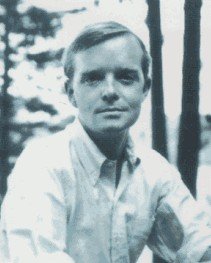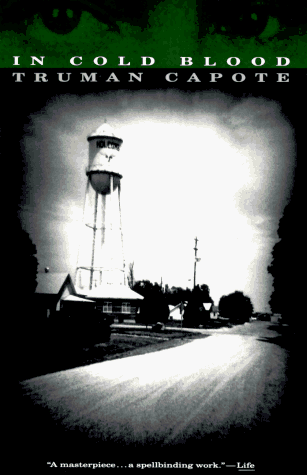
Capote's Ethos According to,
"In Cold Blood"
In the novel, "In Cold Blood," by Truman Capote, many themes have presented themselves as the reader can infer through the writing.  One important key theme, and ethos of the writer, Capote, is, public reaction is very important to one self, no matter who much people like to look confident and careless, public reaction reflects one's actions. This is shown through the authors chosen characters, mini themes, and figurative language. The reader/audience can develop a great sense of understanding with the way Capote writes this novel. An example of the authors ethos is written below.
One important key theme, and ethos of the writer, Capote, is, public reaction is very important to one self, no matter who much people like to look confident and careless, public reaction reflects one's actions. This is shown through the authors chosen characters, mini themes, and figurative language. The reader/audience can develop a great sense of understanding with the way Capote writes this novel. An example of the authors ethos is written below.
Perry, is an important character that creates the plot. He shows himself as paranoid, and thoughtful. He doesn't want to get caught, and put in jail. He is terrified. This presents the authors ethos in which the public cannot find out he murdered the Clutter family. If the case is settled, then he goes to jail. A quote from the story is, " Perry, as the parol car drew alongside, nodded." Perry has been watching for his life. He is guilty and has a guilty conscience. It kills him inside. This gives the reader a good feeling. It shows how bad he feels for the crime he has done.
Another important character named Dick, is characterized in many ways. He is confident, careless and the complete opposite of Perry. Even if they are partners in crime. Dick and Perry have been speaking of what they've done. Dick seems so calm. Deep, deep down, after killing someone, you feel pathetic, and hide your feelings. This also presents the authors ethos. If Dick was not this way, everything would go crazy. "Get the bubbles out of your blood. Nothing can go wrong." Dick explains to Perry. Dick definitely brings life and fun to the story. This reflects his surroundings.
A mini theme is, once something bad happens, it is hard to trust those around you. This presents the authors ethos because again, public reaction is involved. After the Clutter family was killed, everyone freaked out. Not knowing the reason for the killing really scared neighbors. ".. to endure the unique experience of distrusting each other; understandably, they believed that the murder was among themselves.. " After this incident, they feel they all have to watch their backs. This is important to the story, which supports sub-conflicts.
Another theme that supports the ethos is, it takes time to create good plans. This supports the ethos because after creating good plans, public reaction and your surroundings will see those, and judge you. Everyone's emotions are taking over at this point. Planning and pondering are two things on their minds. A quote from the book is, " Toward the end of the summer, he has evolved another plan. He spent three months polishing it. Finally, there came a near-zero November night when he was ready to act." This showed everyone occupied. It also kept the storyline going. After All the problems and troubles, they kept, coming and coming.

An example of figurative language from the book which supports the authors ethos is, " .. fixed them with a gaze of unique persistence, as though he tried to paint their portraits from memory." This example of figurative language represents his look towards he surroundings, again. Capote cares a lot about surroundings. This reflects the book because while this is happening, the problems create a backbone for the story. While this characters are in public places, the problems are very out there and public.
As you can see, the author creates many writing ideas to support this theme through his novel. He has done a spectacular job. The reader and audience can develop a great sense of feel and understanding of his story. The public reaction, the environment, your surroundings thoughts, they are important. They reflect you, your thoughts and actions and your posture. Capote does a great job in showing this. It is very significant.